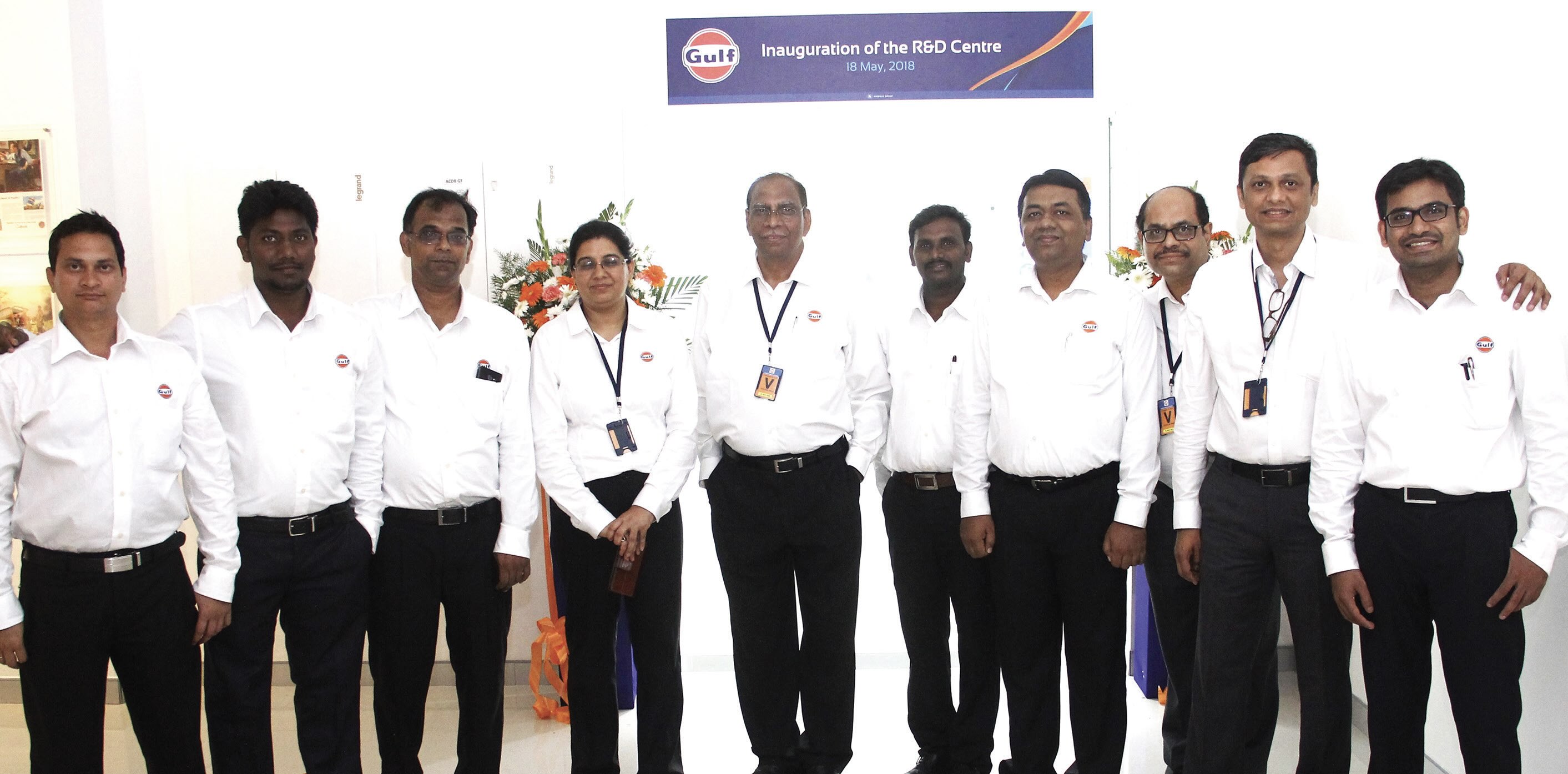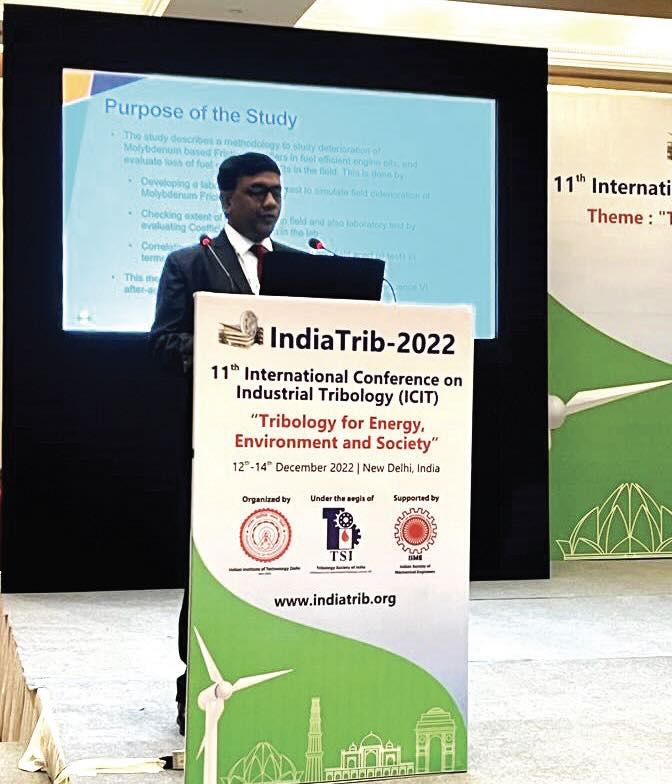TLT: How long have you worked in a lubrication-related field, and how did you decide to pursue a career in the lubricants industry?
Kumar: I have been involved in the lubricant sector for nearly 28 years now. I was always enthralled with nuances in the sciences and technology from a very young age. This passion led me to study mechanical engineering for my bachelor’s degree and further pushed me to pursue industrial tribology as my master’s degree.
But my true foray into the lubricants segment began with my career at Bharat Petroleum Corp. Ltd. in India. Here, I became involved in the development of a diverse range of lubricants. I found this an excellent opportunity to use the technical knowledge I learned during my education and use it in a meaningful way to make real products. It was more than fascinating to observe the different facets of lubricants, going beyond the tribology I was trained in. My stint here allowed my horizons to broaden and provide evidence that lubricants are much more than just oils in machines.
TLT: What has been your most rewarding accomplishment throughout your career in the lubricants industry?
Kumar: It might be a little difficult to express this, but my career itself has been a great source of pride for me. During my tenure at GOI, I played a crucial role in the development of over 1,000 new products and obtaining over 400 OEM accreditations. During this time, I also had the chance to train and mentor several young talented minds, navigating them through the fields of lubricant research.
Being able to contribute to the growth of GOI, developing quality products with proven performance, all the while contributing to an improvement in global productivity, has been incredibly satisfying.
TLT: What is the No. 1 piece of advice you would give to a person who might be interested in starting a career in the lubricants industry?
Kumar: I believe there are two nuggets that would be helpful to any newcomer to the industry.
The lubricants industry is evolving. Update yourself on the latest developments in technology, governmental regulations and the demands of the market and consumers. These are the factors that determine the nature and performance of lubricants. It will be immensely helpful to anyone in the industry to be aware of the needs of the day, whether they are in production, marketing, sales or R&D.
However, knowledge and competitiveness are not the only aspects that would help you grow. Equally important is building a strong network. Connect with people in the lubricant and related industries by attending conferences and seminars. Develop amity with newcomers to the lubricant segment. Learn from or discuss ideas with experienced professionals. Not only will this kind of networking help you solve problems down the line but may help provide a new step to your career. Personally, I also think having friends in the industry makes attending conferences more congenial.
 Sanjay Kumar (4th from the right) with his R&D colleagues during the inauguration of Gulf Oil International’s state-of-the-art R&D center in Chennai, India, in May 2018.
TLT: Throughout the different segments within your career, which one has been the most interesting, challenging and/or rewarding?
Sanjay Kumar (4th from the right) with his R&D colleagues during the inauguration of Gulf Oil International’s state-of-the-art R&D center in Chennai, India, in May 2018.
TLT: Throughout the different segments within your career, which one has been the most interesting, challenging and/or rewarding?
Kumar: A project I found quite challenging was when I was tasked with developing an entire portfolio of metalworking fluids. Metalworking fluids, particularly emulsifiable water-based metalworking fluids, are tricky to formulate. The type and nature of the fluid changes based on the machining operation, the metallurgy of the components and the operating conditions. The seemingly infinite variety of these factors necessitates a wide range of products with subtle changes to formulation and performance.
Due to my background in mechanical engineering and industrial tribology, understanding the application and the metallurgy was not an issue. However, I had to build up knowledge of additive chemistry, focusing on the nature of the components required and ensuring their compatibility with each other and with the metals involved. I found the formulation of semisynthetic-type emulsifiable cutting fluids to be quite challenging but mentally invigorating. Having to experiment with the fine balance of chemistries to ensure product stability and the right performance was no trifling task. But we got the job done.
 Sanjay Kumar presenting a research paper at the 11th International Conference on Industrial Tribology (ICIT), held in New Delhi, India, in December 2022.
Sanjay Kumar presenting a research paper at the 11th International Conference on Industrial Tribology (ICIT), held in New Delhi, India, in December 2022.
TLT: What are some of the most technical lubrication-based concepts or topics you have encountered throughout your career?
Kumar: I find the most technical and challenging concept in lubrication is the fundamental aspect of lubrication itself—friction. Particularly, how to transform our understanding of friction into our products to provide better value.
During my career, I have seen significant strides in vehicle, equipment and machinery design. Each application works with different materials, environment and working conditions. This, in turn, means that the friction and the lubrication requirements keep changing. With constant evolution for better productivity, efficiency or improved sustainability, these requirements become more demanding. Being able to understand where and how friction is critical in the system and use this information to design the perfect product—or as close to perfect as possible—is something that always excites me.
Friction as a phenomenon has been studied for centuries, yet I believe we have a lot more to understand about it.
TLT: What is the one thing you wish you would have learned earlier in your career?
Kumar: My journey to this point in my career is the culmination of several learnings, advice and leaps of faith. There are a number of things any aspiring professional needs to learn such as developing fundamental knowledge, the importance of communication, networking with other professionals, keeping yourself updated on the industry and so on.
However, the one thing I wish I learned earlier than I did is the importance of expanding your knowledge. It is definitely important to develop expertise in one particular aspect of your career. This would help you stand out and be in front. However, from my experience, this is a limitation of its kind—a tunnel vision of sorts. Develop awareness of other aspects in your field, in other industries and of knowledge in general. Even if your experience and focus are on automotive oils, read up on metalworking fluids. Even if you are a chemist, study up on engineering. Spend a portion of your time learning all things new. This not only opens your mind to new information but also to new perspectives.
You can reach Sanjay Kumar at kumars4181@gmail.com.